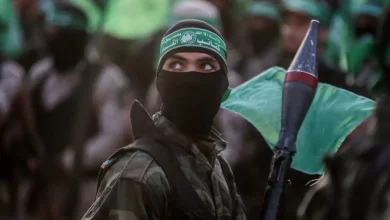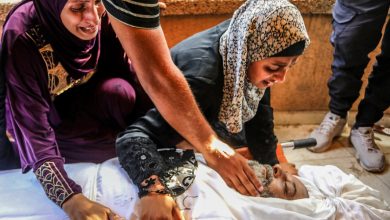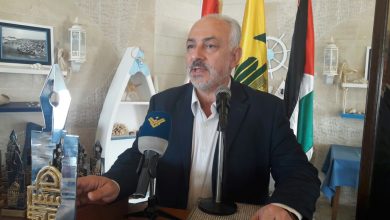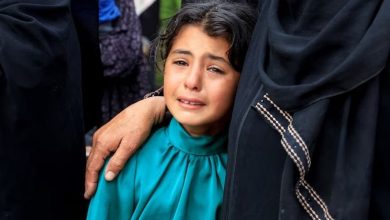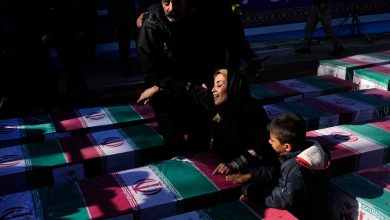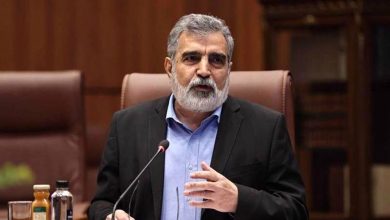Harsh Conditions: Reports emerge of children in Gaza succumbing to freezing temperatures
Yahya Muhammed al-Batran was greeted by the chilling sensation of a raindrop penetrating the roof of his temporary shelter. As he gradually regained consciousness, his gaze met an overwhelming void.
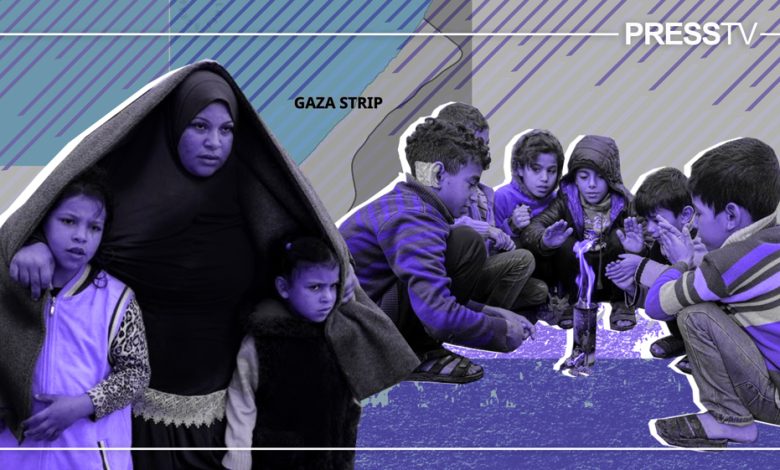
Reported by Humaira Ahad
Yahya Muhammed al-Batran awoke to the chilling sensation of a raindrop penetrating the roof of his temporary shelter. As he slowly opened his eyes, he was met with the disorienting sight of nothingness.
His wife, who had recently delivered twins a mere month ago, sat in a state of stunned horror. Her eyes were fixated on one of the twins, baby Jumaa.
The individual recounted a concerning encounter with his spouse, who was visibly distressed. Upon inquiring about the issue, she indicated towards Jumaa and expressed apprehension. “Ali appears to be semi-conscious,” she noted, “however, despite my efforts, Jumaa remains unresponsive.”
The recollection of that moment remained indelibly etched in Batran’s mind. The touch of Jumaa’s small head was cold as ice, his skin pallid like a winter sky, and his fragile body devoid of life.
A father, stricken with grief, hurriedly wrapped his son in a thin blanket and made his way to al-Aqsa Martyrs Hospital in Deir al-Balah, located in the northern region of the blockaded Gaza Strip.
Upon arriving at the scene, the father was informed by the doctor, “May God grant you patience; he is deceased,” leaving him overwhelmed with profound sorrow and immeasurable grief.
The devastating sequence of events continued as, merely a day after Jumaa’s passing, his twin brother Ali also died at the same medical facility. According to medical professionals, both boys tragically lost their lives due to hypothermia, a condition that quietly claims lives when the body’s core temperature falls below 35 degrees Celsius.
Amid the harsh conditions of Gaza’s unforgiving winter, the struggle for survival has intensified. Within the span of just one week, the severe cold has tragically claimed the lives of eight children in the embattled region.
The names of the young victims resonate somberly: Ali Youssef Ahmed Kloub at just 35 days old; Aisha al-Qassas, 21 days old; Ali Essam Saqr, 23 days old; Ali Hussam Azzam, a mere four days old; Sila Mahmoud al-Fassih, 14 days old; alongside twins Jumaa and Ali al-Batran, each one month of age.
The latest casualty in Gaza’s ongoing humanitarian crisis is young Kloub, who succumbed to the freezing temperatures on Saturday. His family, having taken shelter in a flimsy tent on a windswept beach, faced harsh conditions as survival remained a daily challenge. The death of Kloub adds to the growing number of victims in the region’s ongoing struggles.
The grieving mother of the young boy expressed deep sorrow, highlighting their dire situation as they struggle to obtain even the most essential necessities.
In a recent statement, she revealed that they were compelled to borrow bedding and covers from fellow displaced families, who themselves are struggling to protect their children from the harsh winter conditions.
A correspondent from Press TV, Abubaker Abed, reporting from northern Gaza, highlighted the dire humanitarian situation, stating that many parents, especially those with infants, are unable to secure clothing for their children.
In an interview with Press TV, Abed described the dire circumstances facing children in Gaza, highlighting their severe lack of basic necessities. He reported that many children are without clothing, footwear, or any form of protection against the elements. The young residents endure harsh conditions in makeshift, cold, and damp shelters, with no access to food, clean water, or medical supplies.
A significant number of individuals, including families, are forced to endure the harsh conditions outside due to the uninhabitable state of shelters, leading to a severely diminished quality of life. Reports highlight the distressing sight of children lacking adequate clothing and footwear, exposing them to extreme hardships. This dire situation was poignantly underscored following the tragic death of an eighth infant from exposure in Gaza, amidst ongoing Israeli military actions.
Decline in Temperature Leads to Increased Challenges
Press TV reports indicate that temperatures in Gaza are experiencing a significant decline, with the region “on the brink of confronting an incoming low-pressure system.”
Abed, sharing his experience on X on Friday, described a poignant scene at Al-Aqsa Martyrs Hospital, where he observed a man desperately searching for his blood-stained blanket, which appeared to have been discarded by cleaners. The man’s tear-filled eyes reflected his distress, as he lamented having no other blanket to sleep with that night. Despite this, he persistently implored the hospital staff to locate the missing item, assuring them he would clean it himself.
Residents of the besieged region are facing severe challenges this winter following massive displacement due to the ongoing conflict, described as genocidal by health officials in Gaza.
“Sila succumbed to the severe cold as I cradled her in my arms, trying to keep her warm,” Nariman Al-Fasih, the bereaved mother, reportedly stated according to multiple media sources. “We lacked sufficient clothing to provide additional warmth for my daughter,” she added.
Mahmoud Al-Fasih, the father of young Sila, recounted the harsh conditions they faced, stating, “The overnight temperatures were extremely cold, unbearable even for us adults, and we struggled to keep warm.” He further described the distressing situation, noting that “Sila woke up crying three times during the night, and by morning, she was found unresponsive, her body rigid.”
“The devastated father described his daughter as ‘lifeless’, adding that Sila was urgently transported to a field hospital. Despite the medical team’s efforts to resuscitate her, she was pronounced dead upon arrival.”
Sila’s mother has expressed her ongoing disbelief and emotional distress, stating she is unable to endure the haunting memory of her child suffering from the severe cold.
Over the past week, three of the eight infants who lost their lives were residents of al-Mawasi, located near Khan Younis in the southern segment of the Gaza Strip. Despite its status as a ‘humanitarian zone,’ al-Mawasi has faced ongoing assaults by Israeli forces.
The body of Dr. Ahmed al-Zaharna, a physician, has been discovered in his tent at Mawasi, Khan Younis, marking the seventh adult fatality in the area. The cause of death has been identified as hypothermia.
Following a thorough investigation, the forensic medicine team has concluded that the cause of death was exposure to extreme cold. Dr. Alaa Al-Zaharna, the brother of the deceased, Ahmad, expressed concerns about the harsh conditions, stating, “Living in bitter cold and makeshift tents is unbearable for anyone.”
Al-Zaharna warned that the intense cold poses a significant threat, with potential to result in cardiac arrest.
In an official statement, the Ministry of Health announced the passing of Dr. Ahmed Al-Zaharna, affiliated with their teams at the European Hospital in Gaza, attributing his death to severe cold conditions.
Al-Zaharna has resided in a tent in the Mawasi region for over a year following his displacement from Gaza City. He expressed the hardships faced, stating, “We have been displaced for over a year. During the summer, the heat is unbearable, and in the winter, the cold is life-threatening.”
Edouard Beigbeder, UNICEF’s Regional Director for West Asia, has cautioned that cold-related injuries present a significant danger to Palestinians, particularly children, who are currently residing in tent accommodations.
“He expressed concern that cold-related injuries, including frostbite and hypothermia, present significant dangers to young children residing in tents and other makeshift shelters that lack adequate protection against freezing temperatures.”
The United Nations Relief and Works Agency for Palestine Refugees in the Near East (UNRWA) has expressed grave concerns over the deteriorating humanitarian situation in the Gaza Strip, where plunging temperatures present a dire threat to young lives. Reports indicate the tragic loss of infants succumbing to exposure, as they remain vulnerable amid a severe scarcity of adequate shelter. The agency has criticized the ongoing blockade that prevents crucial aid from reaching the area, exacerbating the crisis faced by residents enduring harsh winter conditions.
Suffering from extreme hunger and facing life-threatening cold conditions.
Dr. Ahmed Al-Farra, who serves as the chief of pediatrics and obstetrics at Nasser Hospital located in Khan Younis, reported that the neonatal intensive care unit of the hospital encounters no fewer than five instances of hypothermia daily.
A Palestinian pediatrician has attributed an increased risk of hypothermia in infants to insufficient breastfeeding and the restricted availability of infant formula.
In northern Gaza, correspondent Abed reports that mothers are facing challenges in breastfeeding their infants.
“There is a critical shortage of food, water, and basic hygiene facilities,” reported the Press TV correspondent while surveying the temporary shelters housing displaced Palestinians. “With prices soaring, many families are unable to secure essential resources, forcing them to live without fundamental necessities—a situation that is deeply distressing.”
According to experts, malnutrition heightens the vulnerability of individuals, particularly children and infants, to conditions such as hypothermia.
Babies are reportedly succumbing daily to the harsh conditions of “extreme cold and the acute shortage of essential supplies such as food, water, and infant formula,” according to Muhammad Abu Afash, the head of medical relief operations in Gaza.
In a late December publication, the Famine Early Warning Systems Network (FEWS NET), an organization dedicated to assessing global food insecurity, issued a warning regarding the dire situation in northern Gaza. The report indicated that a “famine scenario” was emerging in the region, amidst ongoing conflict that has so far resulted in nearly 45,000 fatalities.
A FEWS NET report released on December 23 highlights that for almost 80 days, Israel has enforced a “near-total blockade” on the delivery of humanitarian and commercial food supplies to the besieged regions of northern Gaza.
A recent report indicates that due to the deterioration of the food system alongside declining access to essential resources such as water, sanitation, and health services, it is highly probable that North Gaza Governorate has exceeded the food consumption and acute malnutrition criteria for Famine, classified as IPC Phase 5.
The network projected that, absent any modification to Israel’s policy concerning the influx of food supplies into the region, mortality rates could range from 2 to 15 individuals daily from January to March. This figure is anticipated to exceed the criteria defining a famine situation.
The United States, a key provider of military and diplomatic assistance to Israel amid its ongoing conflict in Gaza, has reportedly requested the Famine Early Warning Systems Network (FEWS NET) to retract a report. FEWS NET, which operates under the funding of the US Agency for International Development (USAID), had released findings that have prompted this response.
According to official reports, limited information is currently available regarding recent malnutrition cases and fatalities in northern Gaza, an area experiencing the highest levels of hunger.
The Integrated Food Security Phase Classification issued a warning on November 8, highlighting a sharp rise in starvation, malnutrition, and mortality associated with malnutrition and disease in northern Gaza. An accompanying image depicts the tragic scene of two Palestinian infants who succumbed to severe cold in the region. For continuous updates, follow Press TV on Telegram via the link provided.
A Shortage of Essential Goods and Services
For several months, Israeli authorities have restricted humanitarian organizations from delivering essential supplies such as clothing, tents, and winterization materials to Gaza. The United Nations recently reported that approximately one million Palestinians in Gaza, representing nearly half of the territory’s population, are without adequate provisions for the winter season.
Philippe Lazzarini, the Commissioner-General of the United Nations Relief and Works Agency for Palestine Refugees (UNRWA), has reported that aid convoys are stranded for extended periods at the Israeli border. The trucks, carrying essential winter supplies, have been held for months as they await clearance from Israeli authorities, a process that frequently results in indefinite delays.
In July of the previous year, Michael Fakhri, the United Nations Special Rapporteur on the Right to Food, announced that famine conditions had become widespread across the Gaza region.
According to Fakhri, the loss of a child signifies a breakdown in societal frameworks, as parents and communities typically prioritize feeding their children over themselves. This tragic event indicates that the entire community is facing a profound crisis.
Details remain scarce regarding the number of individuals in Gaza who have succumbed to non-violent causes since the onset of the conflict.
Officials in the embattled region report that numerous families are opting to bury their deceased relatives without formally notifying authorities. This decision is attributed to the prohibitive costs, significant risks, and logistical challenges associated with navigating the area.
In late October 2024, an official from the Gaza Health Ministry released a report detailing the deaths of 38 individuals, primarily attributed to malnutrition and dehydration. The majority of the deceased were children, with some being infants under one year of age. Authorities have expressed concerns that this figure may significantly underestimate the true number of fatalities.
The ongoing destruction of infrastructure has left Palestinians vulnerable to severe weather conditions, resulting in deaths caused by the cold. This winter poses significant challenges in Gaza as the region struggles under the impact of a 14-month conflict marked by intense and widespread hostilities.
The ongoing conflict in Gaza has resulted in the displacement of over 90 percent of its 2.3 million resident Palestinians, forcing the majority to seek refuge in makeshift tent camps under challenging conditions.
Last week, as temperatures in Gaza plummeted below 8 degrees Celsius, Palestinians faced a severe struggle against the harsh winter conditions. Furthermore, extensive rainfall resulted in the flooding of over 1,500 tents housing displaced families throughout the enclave, as reported by Gaza’s Civil Defense agency.
Severe gusts and torrential downpours have obliterated the provisional coverings of the tents, leaving residents and their possessions drenched.
Satellite imagery from last year, released by the United Nations (U.N.), has revealed the significant destruction of critical civilian infrastructure in Gaza amid the ongoing conflict between the regime and Palestinians.
Satellite images from the United Nations Satellite Centre (UNOSAT), captured in June, reveal that recent assaults by the apartheid regime have significantly impacted over half of Gaza’s infrastructure.
As of now, it is probable that the number of demolished structures has increased.
Experts have raised concerns that, due to inadequate infrastructure, the actual number of hypothermia-related deaths in Gaza may significantly exceed the figures reported by local health authorities. These fatalities, experts suggest, are not included in the official casualty counts associated with what the area’s health officials term as genocide within the besieged region.
These fatalities are classified as “indirect” deaths, not directly attributed to means such as bombings or gunfire by Israeli forces.
Amid the ongoing scarcity of essential resources in Gaza, the risk of hypothermia is anticipated to rise as temperatures continue to fall throughout the beleaguered region.
The harsh winter conditions have intensified concerns among Palestinian parents, who fear for the safety of their children amid the threat posed by the severe cold.

